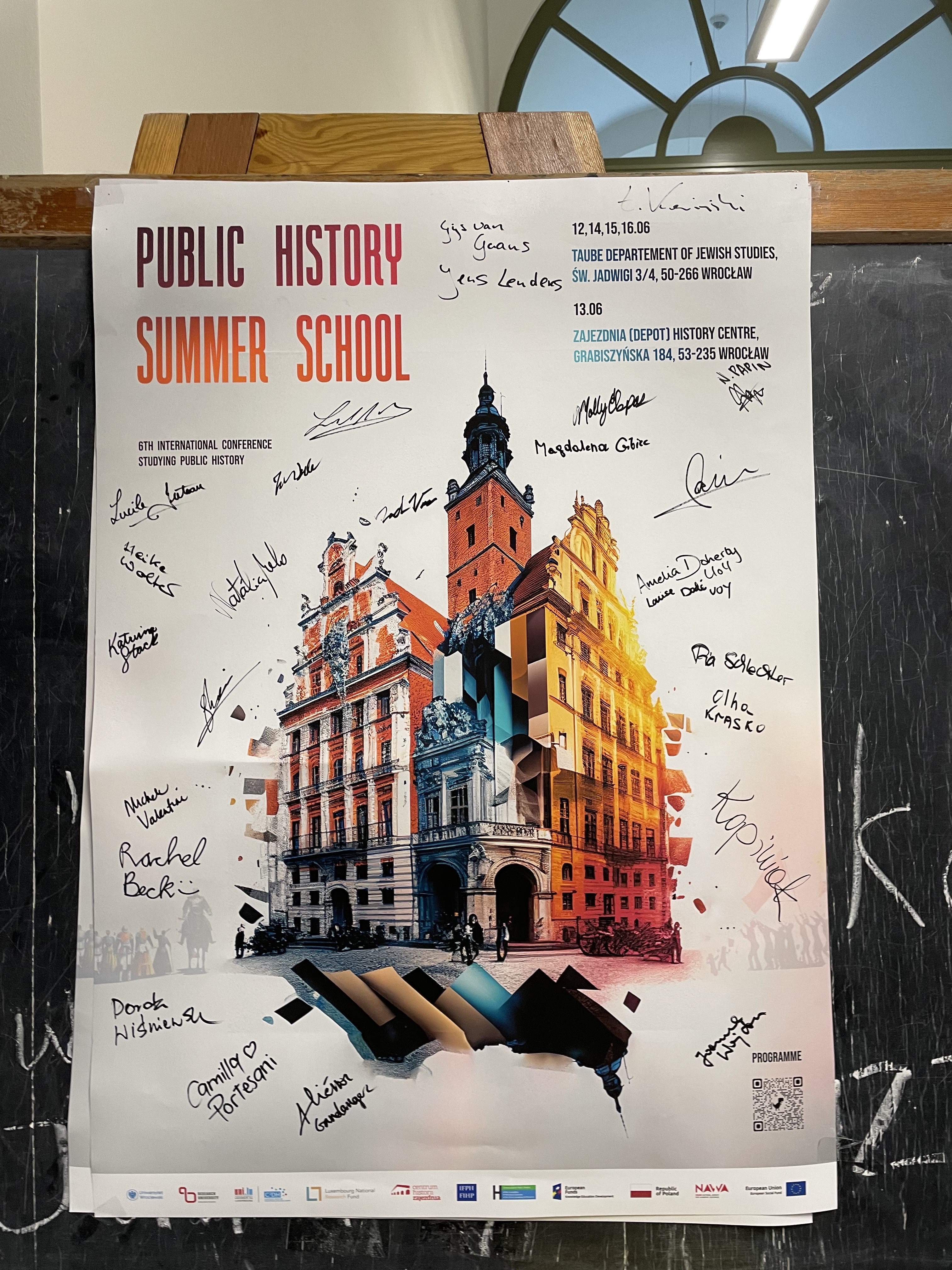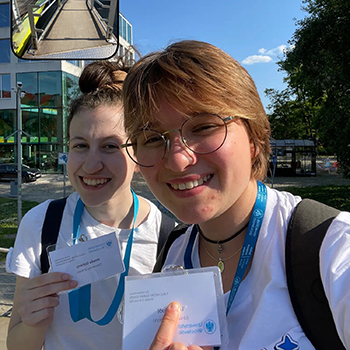IPUP Report: Sixth Annual Public History Summer School
Posted on 27 June 2023

Poster from the summer school, text reads: Public History Summer school, 6th international conference studying public history
We are Meely and L, a third year BA History student and an MA Public History student, and this week we travelled to the Sixth Annual Public History Summer School in Wrocɫaw, Poland, to present our paper ‘Privacy and Performance: The Ethics of Museums’.
Writing our paper
Our paper was about the role of human remains in museums and whether they are educational or entertaining, and how human remains can be presented in a more respectful way to the individual being displayed. We wrote it over the course of a couple months alongside all our coursework and of course our dissertations.
We first heard about the summer school through Vic Hoyle, a member of staff from the Department of History, and also through looking for international summer schools online. While we each found it separately, we decided to go together.
Co-writing a paper was a super interesting and informative experience, as it creates a different set of challenges and opportunities than writing alone does. On the one hand, the workload is split and working with someone whose skills lie where yours aren’t so good (like we did) helps with keeping motivated and ultimately can create a better piece of work. On the other, it can be much easier to go down rabbit holes if somebody else is going down them with you. Our paper ended up being over 9,500 words, so the biggest challenge was cutting it down to fit in the conference.
Getting our place at the summer school
We applied without really expecting to get a place, so it was a very pleasant surprise to hear we’d been accepted with a scholarship. We quickly reached out to Vic, who provided us with an amazing amount of support, from helping us to put our paper into perspective to helping us fill out government funding documents. No question was too small or too stupid, and the day we flew out to Wroclaw came a lot quicker than expected.
Arriving in Wroclaw
On Monday, we flew on two flights – Manchester to Dusseldorf and then Dusseldorf to Wrocɫaw. The flights were calm (even if border control was kind of intimidating) and arriving in Wrocɫaw, we were genuinely blown away that it was actually happening. After checking in to our apartment in the city, we headed to the bank to collect our scholarship, where we ran into three new friends, from three different countries. Luckily, one of them spoke Polish, as we were playing charades with the bank teller to try to help them understand what we were asking for.
The conference
The now five of us headed towards the University of Wrocɫaw’s Department of Jewish Studies for the first day of the conference. We collected our lanyard and goodies and watched the first of a series of speakers. The speakers over the course of the week hailed from Singapore, the USA, Ukraine, Poland, Germany, Spain, Ireland and more. All speakers were focused on the study of public history, from the place of Holocaust memorials in selfies, to creating a comic book based on nineteenth century letters.
Alongside the lectures, we had the opportunity to attend a number of workshops, from questions to ask in oral histories, to how to get published in a prestigious journal. Speakers came from Stamford University, the Public Historian, the Jewish Museum, University of Luxemburg, and Wrocɫaw itself. We were truly inspired by all the information shared and by the wonderful people we got to meet.

Meely (BA History student) and L (MA Public History student) stood outside with their passes to the Sixth Annual Public History Summer School
A chance for new experiences
The conference was an awesome opportunity to meet people with a shared interest in history from across the world. While we were a little younger than everybody else, we still enjoyed trying new Polish foods, exploring the city with others (including a conference-organised walking tour) and even just chatting in between the lectures during the coffee and cake breaks. It is an experience we will never forget, and we would fully recommend other students try!
Our three top tips for international conferences
- Try and learn a bit of the local language before you arrive. 'Please', 'thank you', 'hello', and 'excuse me' go a long way to helping you be polite.
- Figure out where the conference is before you arrive. We had a really well-placed apartment and it made it so much easier, especially for the early-morning lectures.
- Don’t be afraid to go up to people. Everybody there is aiming to learn more from one another, and will be super friendly. It makes the conference much more enjoyable if you have someone to share it with.
Our three top tips for co-writing
- Identify one another’s strengths and the things you don’t like so much. I love writing and L loves researching so we were able to bounce off of each other really well.
- Check in with each other and be open and honest; don’t be afraid to say if you’re struggling. We found parts of our paper very difficult to write. But by being upfront about this, we were able to figure out how to decompress so we both stayed motivated and stuck to time, without burning out or losing passion for the paper.
- Be open about your next steps. We have two different career paths in mind, so when we wrote the paper we did so with the expectation of the conference and (hopefully) publication – but not of expanding it. If you know what your aims are, it makes it easier to meet them, and stops someone being overwhelmed or disappointed.
Final thoughts
Overall, our time in Wroclaw was an absolute blast, and we’re both so glad we took the leap and tried something new. The impact on our confidence is immense and our future is certainly brighter because of it. The chance to explore a new place while exploring your academic interests is something so unique to university and academia, and you should take any opportunity that comes your way. Remember – everything is good practice!
Signing off,
Meely and L
